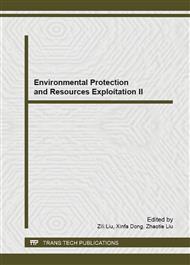[1]
http: /www. unwto. org/facts/menu. html.
Google Scholar
[2]
In Chinese: Qing-zhong Ming. Tourism industry geography: the core and the theme of Tourism Geography research [J]. Journal of Yunnan Normal University, 2009, Vol. 41, No. 2, pp.51-56.
Google Scholar
[3]
In Chinese: Yu-xin Li. The construction and application about evaluation index system of rural tourism ecological level [J]. Southwest Nationalities University, 2010, No. 7, pp.219-222.
Google Scholar
[4]
In Chinese: Zhang-quan Su, Jian-feng Xiong, etc. The study of the regional eco-tourism industry system and its evolution assessment methods [J]. Tourism Forum. 2011, No. 5, pp.37-42.
Google Scholar
[5]
Schaltegger S, Sturm A. Okologische Rationalitat: Ansatzpunkte Zur Ausgestaltung You kologieorienttierten Management Instrument [ J ]. Die Unternehmung, 1990, No. 4, p: 272-290.
Google Scholar
[6]
World Business Council for Sustainable Development (WBCSD), http: /www. wbcsd. org/templates/TemplateWBCSD5/layout. asp?MenuID=1.
Google Scholar
[7]
Organization for Economic Co-operation and Development (OECD), http: /www. oecd. org/general/searchresults/?q=eco-efficiency.
Google Scholar
[8]
Eco-efficiency conference, http: /www. eco-efficiency-conf. org.
Google Scholar
[9]
Odum, H.T. Environmental Accounting: Emergy and Environmental Decision Making[M]. New York: Chichester Wiley. (1996).
Google Scholar
[10]
Odum, H.T., Brown, M.T., Brandt-Williams, S.L., Folio #1: Introduction and global budget. Handbook of Emergy Evaluation: A compendium of data for emergy computation issued in a series of folios. Centerfor Environmental Policy. University of Florida, Gainesville. May (2000).
Google Scholar
[11]
Almeida, C.M.V.B., Rodrigues, etc. Emergy as a tool for Ecodesign: evaluating materials selection for beverage packages in Brazil [J]. Cleaner Production, 2010, No. 18, p: 32–43.
DOI: 10.1016/j.jclepro.2009.03.019
Google Scholar
[12]
Huppes,G.; Ishikawa,M. Eco-efficiency and its terminology [J]. Industrial Ecology. 2005, Vol. 9, No. 4, pp.43-46.
Google Scholar
[13]
Paul Peeters, Jean-Paul Ceron, Ghislain Dubois, Trista Patterson, Robert B. Richards. The eco-efficiency of tourism [J]. Ecological Economics. 2005, Vol. 54, No. 4, p.417–434.
DOI: 10.1016/j.ecolecon.2004.10.006
Google Scholar
[14]
Reilly, JM, Haider W, etc. Improving eco-efficiency for tourism transportation: the case of whistler, British Columbia [C]. International Symposium on Society and Resource Management. Vancouver, BC: Simon Fraser University. (2006).
Google Scholar
[15]
Joe Kelly, Wolfgang Haider, etc. Stated preferences of tourists for eco-efficient destination planning options [J]. Tourism Management. 2007, Vol. 28, No. 2, pp.377-390.
DOI: 10.1016/j.tourman.2006.04.015
Google Scholar
[16]
In Chinese: Peng Li, Gui-Hua Yang, etc. GHG emission based eco-efficiency study on tourism itinerary products in Shangri-La of Yunnan [J]. Acta Ecological Sinica, 2008, No. 5, p: 2207-2219.
DOI: 10.1080/13683500802475943
Google Scholar
[17]
In Chinese: Yu-qin Su. The research on efficiency evaluation and optimization of eco-tourism in coastal zone based on data envelopment analysis [D]. The PH. D Degree Paper of Central South University of Forestry and Technology. May (2012).
Google Scholar
[18]
In Chinese: Xiao-long Ma,Ji-gang Bao. Study on the evoluation of Chinese primary cties' toruism efficiency influence factors [J]. Economic Geography. 2009, Vol. 29, No. 7, p: 8-9.
Google Scholar
[19]
In Chinese: Jin-he Zhang, Hong-tao Jiang, etc. Progress on tourism eco-efficiency and its implications [EB/OL]. Advanced Materials Research. www. scientific. net 2013/13.
Google Scholar
[20]
Mark T. Brown, Sergio Ulgiati. Emergy Measures of Carrying Capacity to Evaluate Economic Investments[J]. Population and Environment. 2001, Vol. 22, No. 5, pp.471-501.
Google Scholar
[21]
In Chinese: Li-min Huang. Analysis of tourism economics system based on emergy theory [J]. Productivity Research. 2010, No. 7, p: 106-108.
Google Scholar
[22]
In Chinese: Hong-bo Li, Yan-yan Li. An emergy analysis on the ecotourism system of Wuyishan Natural Reserve [J]. Acta Ecologica Sinica, 2009, Vol. 29, No. 11, p: 5869~5876.
Google Scholar
[23]
In Chinese: Nan-nan Wang, Jinhe Zhang, etc. An emergy analysis of the tourism ecosystem of Jiuzhaigou Nature Reserve [J]. Geographical Research. 2013. Vol. 32, No. 12, p : 2346-2356.
Google Scholar
[24]
In Chinese: Li-jun Guan, Yu-ping Xie. The application for emergy analysis theory in ecological agriculture tourism complex systems—taking Guilin Gongcheng Yao Autonomous County for example[J]. Social Scientist. 2009, No. 10, p: 94-97.
Google Scholar
[25]
In Chinese: Qing-zhong Ming. Tourism Industry Ecological: A New Perspective of Tourism Sustainable Development [N]. China Tourism News, 2011, 11-23-011.
Google Scholar


